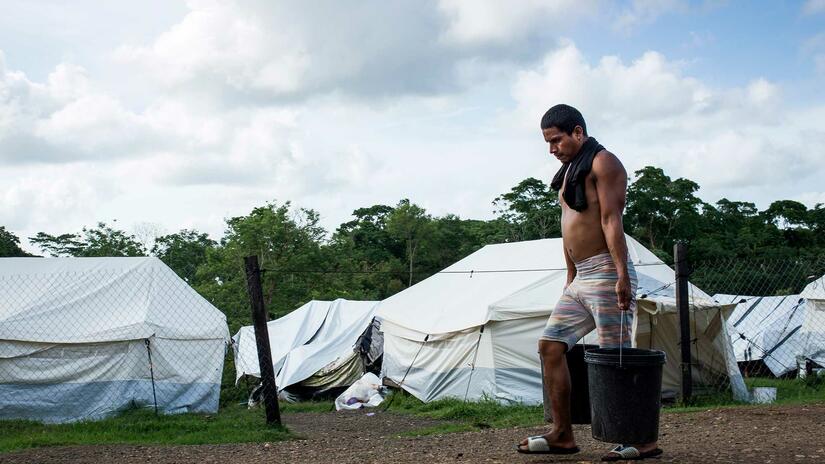
The International Federation of Red Cross and Red Crescent Societies (IFRC) is ramping up efforts to provide protection and humanitarian assistance to migrants travelling through the Darién Gap, one of the most dangerous migratory routes in the world. Between January and August of 2021, 70,376 migrants (including 13,655 children) have crossed the Panamanian jungle, an amount in par with the total number of migrants over the last five years.
In the past few years, the Darién Gap has become a common transit point for migrants headed north, but the latest figure vastly surpasses the high numbers of 2016, when 30,000 people made the crossing throughout the whole year. In comparison, in August 2021 alone, 25,361 people have used this route.
Martha Keays, Regional Director for the Americas at IFRC, said:
“As the pandemic and its impacts persist, the number of migrants crossing the Darién Gap has hit all-time highs this year. In Panama, we have seen between 600 and 1,300 people entering the country every day. They face many risks during their journey through the jungle, often showing signs of physical and mental trauma. The Red Cross is there to support them to meet their basic needs, such as safe water, sanitation, healthcare, protection, information and psychological support.”
In response to the growing number of people crossing the Darien Gap, the IFRC has activated its Disaster Relief Emergency Fund (DREF) to scale up support to migrants in collaboration with the Panamanian Red Cross. The humanitarian response is focused on the distribution of clean water; promotion of community and personal hygiene; and distribution of essential items, such as mosquito nets. It also includes provision of healthcare and protection services; and the increase of capacities to deliver psychological support. In addition, the DREF supports the Costa Rican Red Cross to prepare for a possible increase in the number of migrants transiting through Costa Rica.
In Colombia, at the end of August 2021, more than 10,000 migrants were waiting in the village of Necoclí at the border between Colombia and Panama, an entry point into the Darién Gap. The Colombian Red Cross is providing them with information about their journey; distributing personal protective equipment against COVID-19; and providing health and protection services to assist vulnerable communities.
According to the Panamanian authorities, migrants of around 40 nationalities have crossed the Darién Gap this year. They come from Asian and African nations, such as Angola, Burkina Faso, Mauritania, Nigeria, Pakistan and Uzbekistan, but also from Latin America and the Caribbean. Many people are Haitian and Cuban, and there has also been an increase in the number of Venezuelan migrants.
“Some of the people currently crossing the Darién Gap have left their home countries years ago to start a new life in South America. But socio-economic disparities, stigma, discrimination, and the COVID-19 pandemic have caused them to lose their jobs or homes, and now they are facing impossible options, such as migrating once again. Access to basic services, such as food, water, sanitation, medical care, housing, essential information, and access to COVID-19 vaccines must be guaranteed to all, regardless of legal status”, added Keays.
The IFRC and its network of Red Cross National Societies have activated a monitoring system to track the population movement from the Southern Cone to Guatemala, including the migratory routes across the Andean countries, the Darién Gap, and Central America. They are also monitoring the evolution of the humanitarian situation in Haiti and Afghanistan, as the increase of humanitarian needs in those countries could lead to further displacement and migration along the Darién route.
In Panama, the IFRC and the Panamanian Red Cross, with support from the European Union, UNICEF and other partners, have been responding to the needs of migrants crossing the Darién for the last three years. Since 2019, they have provided more than 20,000 humanitarian interventions including psychosocial support, health care, access to water, and information on the migratory route.
Thanks again Joe!
Get Vaccinated and stay safe!!